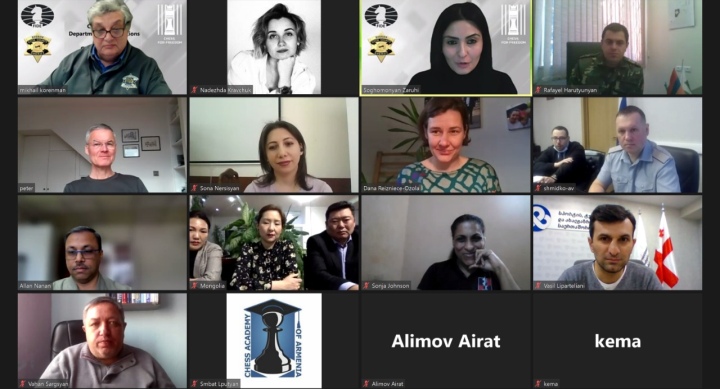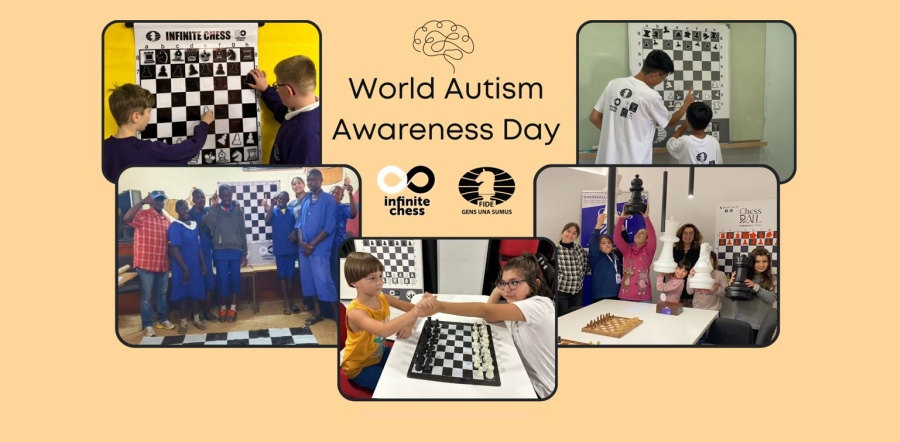
In October 2021, 41 teams from 30 countries representing all continents participated in the Intercontinental Online Chess Championship for Prisoners. The three-day tournament aimed to popularize chess as an efficient tool for reintegrating incarcerated people and provided an opportunity for inmates to play with their peers across the globe. It was decided that the event would take place on an annual basis. To discuss the future cooperation and expand the initiative, a round table discussion was held with the organizers of the tournament, representatives of prisons and correctional facilities of Russia, Mongolia, Armenia, Norway, Georgia, Trinidad & Tobago and England. They shared their experience in chess education in prisons and provided some fresh ideas on how to improve and promote the event.
Back in 2021, team Mongolia won the first Intercontinental Online Chess Championship among Prisoners after defeating team Zimbabwe in the final. It was hardly surprising as the country has a long history of the Chess in Prisons program. National chess competitions have been held since 1958. A national team player WGM Batchimeg Tuvshintugs who works at the Court Decision Making Agency, made a presentation about Сhess in Prisons in Mongolia. She proposed the idea of organizing chess tournaments among prisons' staff too and training correctional institutions' employees: officers, educational departments, enabling them to help their inmates to improve chess skills in future events.

The Chess for Freedom project was also supported by Russia on a national level. One thousand chess programs were launched nationwide, with 22000 prisoners involved. Around 700 inmates played online chess tournaments. Major general Andrey Shmidko, head of the department of social, psychological and educational work with convicts of the Federal Penitentiary Service of Russia, supervisor of the Chess in Prisons project in Russia, said that the chess in prisons movement was launched in the country 22 years ago under the guidance of the world champion Anatoly Karpov. "10 years ago, the program became international. We are happy that the initiative was supported by FIDE and attracted so many countries," he added.
For the first time in the history of international chess tournaments held in prisons, winners were determined in the women's section too. Here, team Georgia won all three matches and came in the clear first. The awarding of the winners was held outside the prison walls. Georgian chess legend Nona Gaprindashvili together with the International Foundation of Sport, Tourism and Youth, awarded the winners at the Sheraton Metekhi Palace Hotel. She was joined by the Minister of Justice Rati Bregadze and the President of the Chess Federation, Gia Giorgadze. "When a person ends up in such circumstances, whatever the reason may be, such an event can give them hope. Chess teaches you to think in advance, for yourself and for your family. It is a good activity." Nona Gaprindashvili said during the awarding ceremony.

Trinidad and Tobago was among the countries where nothing was done in terms of chess events in the correctional institutions due to the pandemic. "Thanks to FIDE and its project, the communication started, the activity plan was implemented, and in October, the team of Trinidad and Tobago could take part in the championship. From the federation to the ministry of communication - everyone was involved, and we managed to present a women team (which we did not have). We managed to train them during 2-3 months, and they did participate." Sonja Johnson, President of the Chess Association of Trinidad and Tobago, said. The country has already made a plan for chess activities in correctional institutions in 2022. The sustainable chess program includes establishing chess clubs in six prisons across the country.

As noted by Chess in Schools and Communities' Prisons Coordinator Peter Sullivan representing England, the most important period was not the tournament itself but the time before it. Three months ahead, all the excitement started - prisoners were preparing, officials playing chess among themselves, media got interested in the initiative. The important decision was taken to allow inmates at participating prisons direct access to the internet to make their moves from prison computers. Previously access to the internet was severely restricted in UK prisons and primarily limited to education. But the Ministry of Justice has approved prisoners to take part in the first Intercontinental Online Championship for Prisoners.

Also, the first results of scientific research initiated by Smbat Lputian, deputy head of the Armenian Chess Federation, and carried out by the Armenian Chess Institute were presented during the videoconferencing meeting. According to them, chess culture is perceived among the convicts not only as a game but also as an opportunity to enter a new social space, where there are no borders. It gives them a feeling of freedom, freshness, redirecting all the potential to their own development. It is the way of re-evaluating self-knowledge and one's own behaviour, which opens a wide field of re-socialization and social inclusion while acquiring new skills and new relationships, regardless of age, gender, race and nationality.
"It is so encouraging to see how life-changing chess can be. The inmates themselves admit that it builds self-confidence and motivates them to show the better part of themselves." Mikhail Korenman, a chess tutor at Chicago Cook County Jail and the driving force of the initiative, added.
"Last year, FIDE reinforced the Chess in Prisons activity that long ago had started under the patronage of the world chess champion Anatoly Karpov. The Chess in Freedom project, as we call it, has become a vital part of our social initiatives where we use chess for educating and empowering various groups of society. We will not only expand our tournament for prisoners (the goal for this year is to reach the participation of 64 countries), but will prepare a training programme and consider the post-prison integration activities." Dana Reizniece-Ozola, FIDE Managing Director, concluded.





